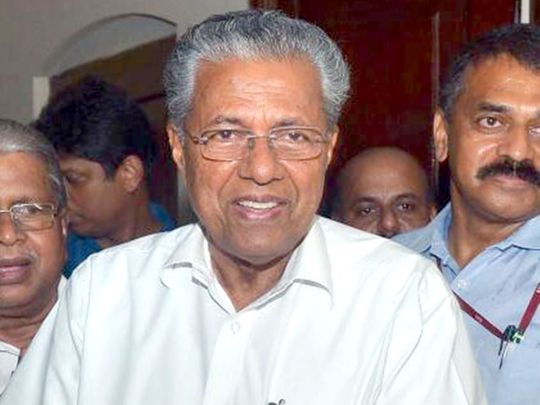
Thiruvananthapuram: Kerala chief minister Pinarayi Vijayan had been under severe political pressure in recent weeks with a wave of allegations against his government. To that mountain of troubles he added another one this week when a bill proposed by him to curb ‘offensive’ media content boomeranged on him on Monday.
The proposed law was a contentious amendment to the Kerala Police Act. Its purported aim was to prevent cyber attacks against women and children by beefing up the Act by the addition of Section 118-A, which stipulates ‘imprisonment for up to five years or a fine of up to Rs10,000 or both to those who ‘produce, publish or disseminate content through any means of communication with an intention to intimidate, insult or defame any person through social media.’
The government managed to get the proposal cleared by the state governor, and the ordinance came into being on Saturday but as criticism mounted against the amendment – from the opposition, social media, the Communist Party of India Marxist’s coalition partner the Communist Party of India, and finally from the central leadership of the CPM itself – Vijayan was forced to recall the ordinance.
Chided by top leadership
The chief minister had egg on his face when the CPM general secretary Sitaram Yechury held a virtual meeting with the politburo members from Kerala and suggested that the ordinance be “reconsidered”.
Vijayan was then left with no option but to take a humiliating U-turn on the matter, leaving his rigid stand of promulgating the ordinance and then passing the bill in the state assembly. His unyielding stand was despite the wave of criticism against the bill, with critics pointing out that it was akin to gagging the media along with social media because the ordinance covered all digital expressions of opinion.
In the end, Vijayan had to surrender quite meekly, with a statement that “The amendment evoked varied responses from several corners. Apprehensions were aired by those who support the LDF and profess to defend democracy. In these circumstances, the government will not go ahead with implementing the amendment.”
Not easy to cancel
Since the state governor had already signed the ordinance, it would not be able to nullify the ordinance, which the Congress and the Bharatiya Janata Party had termed “harsh and draconian”.
Since the ordinance is in place, the state police chief Loknath Behera had to issue a clarification to police officers on Monday, asking them to “approach the legal cell, police headquarters for getting a clarification before initiating any legal steps at the police station level”.
The state government is now expected to bring a repealing ordinance to cancel the existing ordinance that came into play on Saturday. Until that cancellation happens there is uncertainty about what would happen if someone approaches the court based on the existing ordinance, in case of some ‘offensive’ post on social media.
Political setback
The U-turn on the ordinance is also seen as a political setback for the chief minister and the ruling Left Democratic Front. Importantly, the embarrassment comes even as the campaigning is on in full swing for the local body elections early next month.
The decision to withdraw the media-gagging ordinance also comes at a time when the state government is facing investigations by different agencies including the customs department, the National Investigation Agency, the Central Bureau of Investigation and the Enforcement Directorate for different irregularities including a gold smuggling racket using diplomatic channels.
The development also means a loosening of Vijayan’s strong grip on the CPM leadership. Only last week the CPM state secretary Kodiyeri Balakrishnan had to give up his post following criminal charges against his son Bineesh Kodiyeri. Political speculation is whether Vijayan would also suffer a similar sidelining as the countdown begins for his government whose term ends in May next year.








